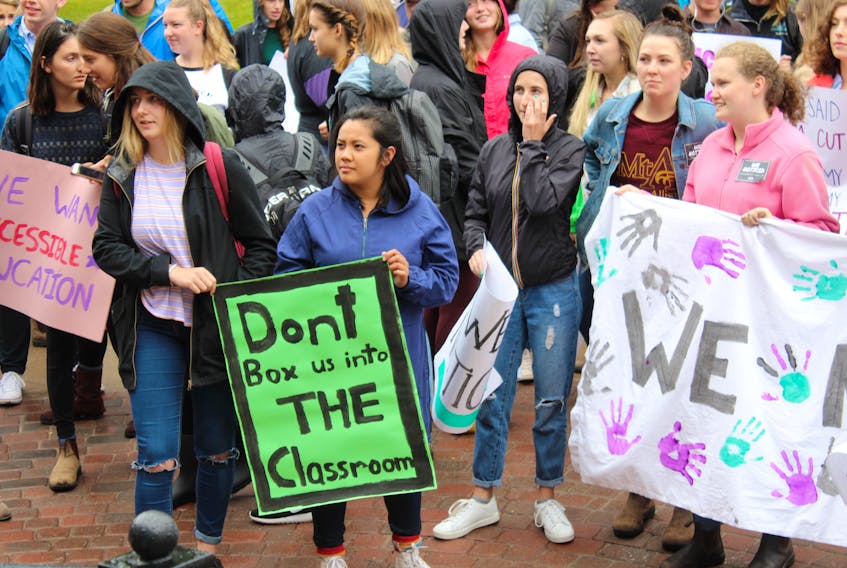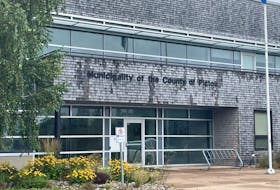SACKVILLE, N.B. – Mount Allison students are pushing back against the university’s recent decision to cancel correspondence courses throughout the academic year.
More than 150 students gathered at the student centre last Tuesday afternoon to take action against the cuts, coming together for a silent protest during the university’s senate meeting at Tweedie Hall.
Noah Fry, vice president of academic affairs for Mount A’s student union (MASU), said the correspondence courses, the majority of which are offered online, are popular amongst students and so he is unsure as to why the university has made this decision – and without consulting the students who will be the impacted the most.
“This is something that is close and dear to students’ hearts,” said Fry.
Fry said online education is important to students, providing accessible and flexible options to those who can’t always make it to the classroom.
“We’re astonished no one was consulted about this or had no influence over this decision.”
MASU brought a motion to the senate meeting, asking for the members of the senate to acknowledge the importance of varied modes of delivery of instruction, especially ample online courses, in the overall student experience.
After a 45-minute discussion, the motion passed with a majority vote of 27-11.
“It was a really good discussion that I wish had taken place before the decision was made,” said Lauren Doane, vice-president of communications for MASU.
Doane pointed out that, although the senate vote doesn’t mean the university has any obligation to reverse its decision, it does offer some support and “legitimacy” towards the students’ efforts to have them eventually reinstated.
“It’s a really good first step,” she said, noting that the next step will be to bring the issue to the university’s board of regents.
MASU learned earlier this summer that the university would not be offering any correspondence courses for the fall and winter terms. A decision has yet to be made on next summer’s correspondence courses.
Fry said students were not involved nor consulted in this process so MASU went to the university administration to discuss the decision. Fry said he was told the courses were becoming a challenge to offer for only a limited number of students; and that the majority of students wouldn’t notice the loss of the courses.
But students have noticed, he said, and that’s why they are taking action.
“Students are not just here for convenience.”
The online courses provide many students, particularly those with mental or physical disabilities, with greater options in their course load. Fry said there are a number of academic buildings on campus that are not accessible, some where students are physically unable to get up the stairs, so not having the ability to take correspondence courses limits the students’ selections.
Many student-athletes also take correspondence courses because of the flexibility it provides in their busy schedule.
“This is forcing students in the classroom, even if they can’t get there,” said Doane.
Doane said she herself was faced with taking online courses last year when she fell ill and was forced to head home for a few weeks to recover. Without that option, she wouldn’t have been able to complete her course load for the year.
“It was helpful for me as well as for a lot of other students,” she said.
Fry said the university has been offering both on-campus and online course for nearly two decades and he doesn’t see why that should change now.
“We can do both.”
Jeff Ollerhead, Mount Allison’s provost and vice-president of academic and research, said interest in the university’s correspondence courses has been waning in recent years. For a number of years, in fact, the majority of courses have had five or fewer students enrolled.
Last fall, only four of seven courses had more than seven students enrolled. So the administration made the decision last winter to stop offering such courses in the fall and winter terms “unless at least eight students were likely to enroll and unless such courses were identified as being needed during our annual process of timetable development.”
Although more than 20 correspondence courses were offered in the spring/summer 2018 term, he said following a review of enrolment data it did not appear that correspondence courses would be required for the fall, “which is why none are currently offered.”
He also noted there are open spots in almost all of Mount A’s on-campus courses this term, providing numerous options for students.
As to the suggestion that not having correspondence courses impacts students with disabilities, Ollerhead explained that the university’s Meighen Centre, which offers services to Mount Allison students with documented disabilities, has not identified any cases this term where a student’s needs cannot be accommodated with on-campus courses.
“We are committed to finding appropriate accommodations for any Mount Allison student with a documented disability.”
“We understand communication on this issue has been frustrating and confusing for students. But, as a smaller university, we cannot do everything,” stated Ollerhead. “Given our limited resources, we opted to prioritize providing teaching resources for on-campus classes, with more in-person interaction between students and faculty and more experiential learning opportunities, over providing resources for lightly-subscribed correspondence courses for the 2018-2019 fall and winter terms.”
Planning for the 2019-20 academic year, including the spring/summer term, has not yet begun, he said, but when it does, academic departments and programs, faculties and the administraiton will reflect on recent events and discussions, including the motion put forth by student senators at the recent senate meeting.









